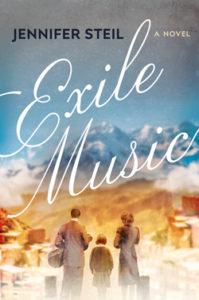Exile Music by Jennifer Steil, Viking Press, 2020, ISBN 9789525-561811, 415 pages, $27.

 SAN DIEGO – This novel, written from the point of view of Orly, a young girl whon we watch grow into adulthood, is about a Jewish family that fled Austria after its merger with Nazi Germany and settled in La Paz, Bolivia, a city that was starkly different from Vienna in almost every way.
SAN DIEGO – This novel, written from the point of view of Orly, a young girl whon we watch grow into adulthood, is about a Jewish family that fled Austria after its merger with Nazi Germany and settled in La Paz, Bolivia, a city that was starkly different from Vienna in almost every way.
The family has left so much behind. Orly’s father had played the viola as a member of the Vienna Philharmonic Symphony, but was dismissed from that post after the Nazification of Germany. Her mother had been an opera singer, with many significant roles to her credit, but she too was stripped of her livelihood.
Orly, herself, had been brutally pulled away from her best friend and upstairs neighbor, Anneliese, for whom she had felt a physical attraction she could not explain.
And all three members of the family desperately missed Orly’s older brother, Willi, who on a mission to protect children from the Nazi scourge, had gone off to Switzerland and disappeared.
After a memorable sea crossing and trek up the Andes Mountains into a high altitude never before experienced, the family members found themselves in a city where there was neither a symphony nor an opera. With the help of an international Jewish aid society, they were able to rent living space from a Bolivian family, whose young son, Miguel, became Orly’s friend and mentor.
Whereas Orly quickly embraced the Spanish language and Bolivian culture, wanting to leave Austria and all that it represented behind, her parents were far slower to adapt. The loss of their livelihoods, their living in an alien environment, and the anguished uncertainty over what had become of Willi prompted different reactions. Orly’s mother stopped singing altogether, not even around the house. Her father, on the other hand, obsessively practiced with his viola. The two drew farther apart.
This is an engrossing novel of discovery in which Orly learns about the Indigenous people of Bolivia, their le gends, and religious beliefs, and in which her parents very slowly begin to adapt to their new circumstances as they wait out World War II. Her mother takes up baking; her father gathers other musicians around him. When the war ends, the family to some extent has been Bolivianized.
After the war, new refugees arrive in Bolivia. Some are concentration camp survivors. Others, however, are escaped Nazis. Suddenly, the family’s world is again in emotional turmoil.
Exile Music is a book you’ll be tempted to read quickly to see how it all turns out, but if you do, you may find yourself regretting that there aren’t even more pages to read. Much of Orly’s new world is enchanting.
*
Donald H. Harrison is editor of San Diego Jewish World. He may be contacted via donald.harrison@sdjewishworld.com